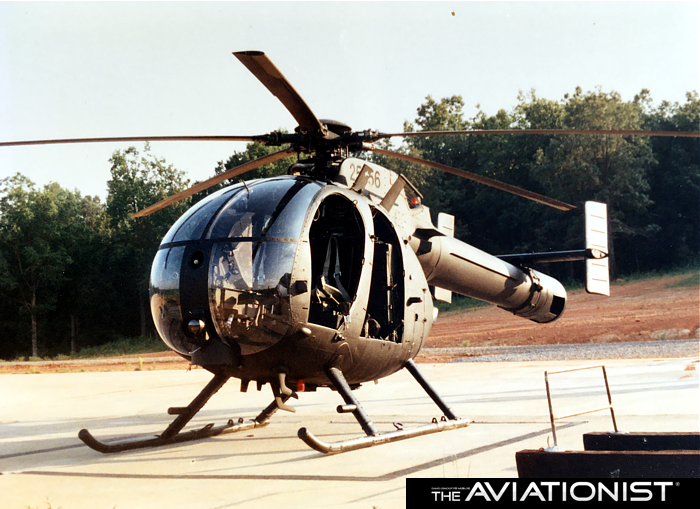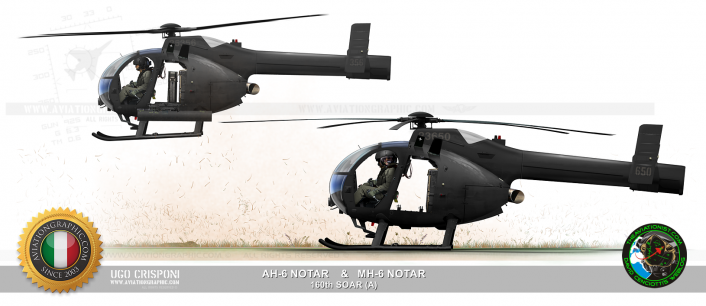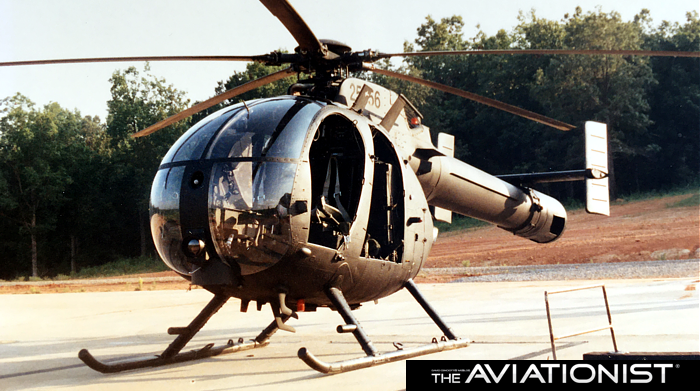We get an unprecedented look at the one of a kind “Little Bird” tested by the U.S. Army’s elite unit.
The U.S. Army 160th Special Operations Aviation Regiment (Airborne) “Night Stalkers” is a highly-specialized combat aviation unit headquartered at Ft. Campbell, Kentucky. The unit supports U.S. and coalition combat units like Army Special Forces, Naval Special Warfare (SEALs) and other special operations units conducting attack, assault, reconnaissance, infiltration and exfiltration, and any kind of known or unknown special operations you may imagine. The “Night Stalkers” operate a variety of assets, including the MH-47G Chinooks, MH-60L/M/K Black Hawks and A/MH-6M Little Birds, which are officially assigned to the 160th SOAR, as well as many other types that are “on loan” from other units.
Among the many variants flown, operated and tested by the “Night Stalkers” there is a little known NOTAR (NO TAil Rotor) variant of the MH-6J. The variant was meant to provide the Regiment with a quieter and safer operation over a traditional tail rotor. Because the fan is enclosed in the tailboom, tail rotor noise, the major source of noise from most conventional helicopters, was significantly reduced. It also eliminated the vulnerable exposed tail rotor blades, eliminating the possibility of persons being injured or killed on the ground and the cause for many confined area maneuvering accidents and preventing the tail rotor to be hit and damaged by enemy fire. NOTAR-equipped helicopters are among the quietest helicopters, a feature that is vital during special operations.
Two MH-6J airframes were converted to NOTAR configuration (hence these are not MD520N, based on the conventional MD 500E): #25356 and #23650. Thanks to an anonymous reader we are able to share some awesome images of these two little known MH-6 NOTAR choppers.
As you can see from the picture below, quite some efforts were spent to adapt the fan and related tailboom to the MH-6J airframe, powered with the Allison turboshaft 250-C30 engine.

The NOTAR (NO TAail Rotor) was developed by McDonnell Douglas Helicopter Systems (through their acquisition of Hughes Helicopters). The system uses a fan inside the tail boom to build a high volume of low-pressure air, which exits through two slots and creates a boundary layer flow of air along the tailboom utilizing the Coandă effect. The boundary layer changes the direction of airflow around the tailboom, creating thrust opposite the motion imparted to the fuselage by the torque effect of the main rotor. Directional yaw control is gained through a vented, rotating drum at the end of the tailboom, called the direct jet thruster. Advocates of NOTAR believe the system offers quieter and safer operation over a traditional tail rotor.

The two “Juliet” MH-6s modified were painted matt black. One airframe, AH-6 NOTAR #25356, was dedicated to test the armed version using the standard AH-6 panoply of weapons: M260 FFAR 2.75″ 7-rockets pod, MG-134 7,62 minigun and AGM-114 Hellfires.


The other airframe MH-6 NOTAR, #23650, was equipped and tested with the EPS (external personnel system) with two hard points fixed to the airframe and the plank attached to them.
These hybrid variants went through formal testing, flight training and mission training to see if they would meet the 160th needs. However, they failed to meet the requirements for a number of reasons:
- Power
- Control ability
- Transportability
Subsequently they were converted to Little Birds and put back into service as MH-6Js. They were never used in any real operation.

The MH-6 NOTAR testing was one last ditch effort to get the NOTAR into the Regiment, especially since the Army had evaluated it years prior. Development of the NOTAR system dates back to 1975, when engineers at Hughes Helicopters began concept development work. In December 1981, Hughes flew an OH-6A fitted with NOTAR for the first time. The OH-6A helicopter (serial number 65-12917) was supplied by the U.S. Army for Hughes to develop the NOTAR technology.
A big thank you to our friend Ugo Crisponi at AviationGraphic.com who contributed to this article.









